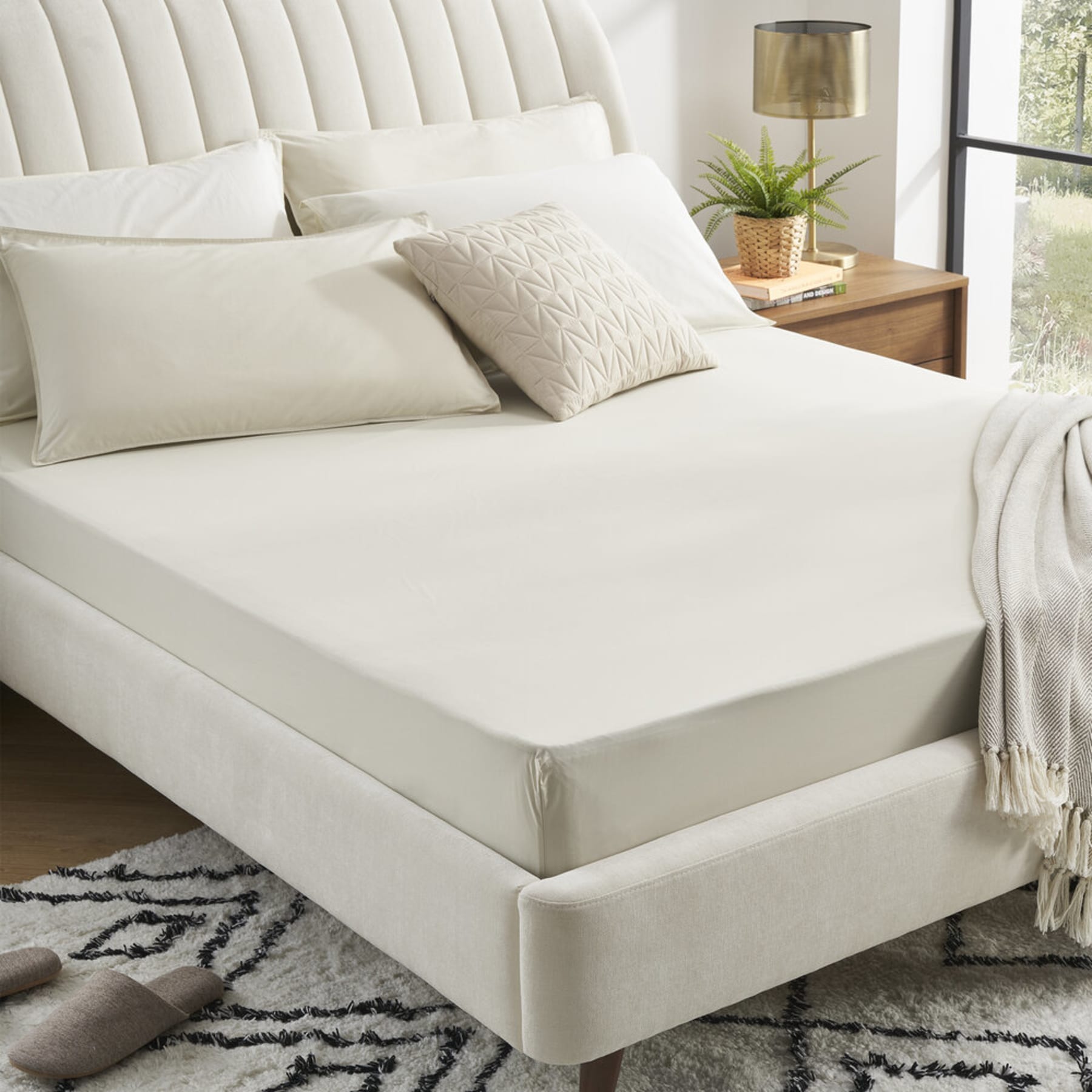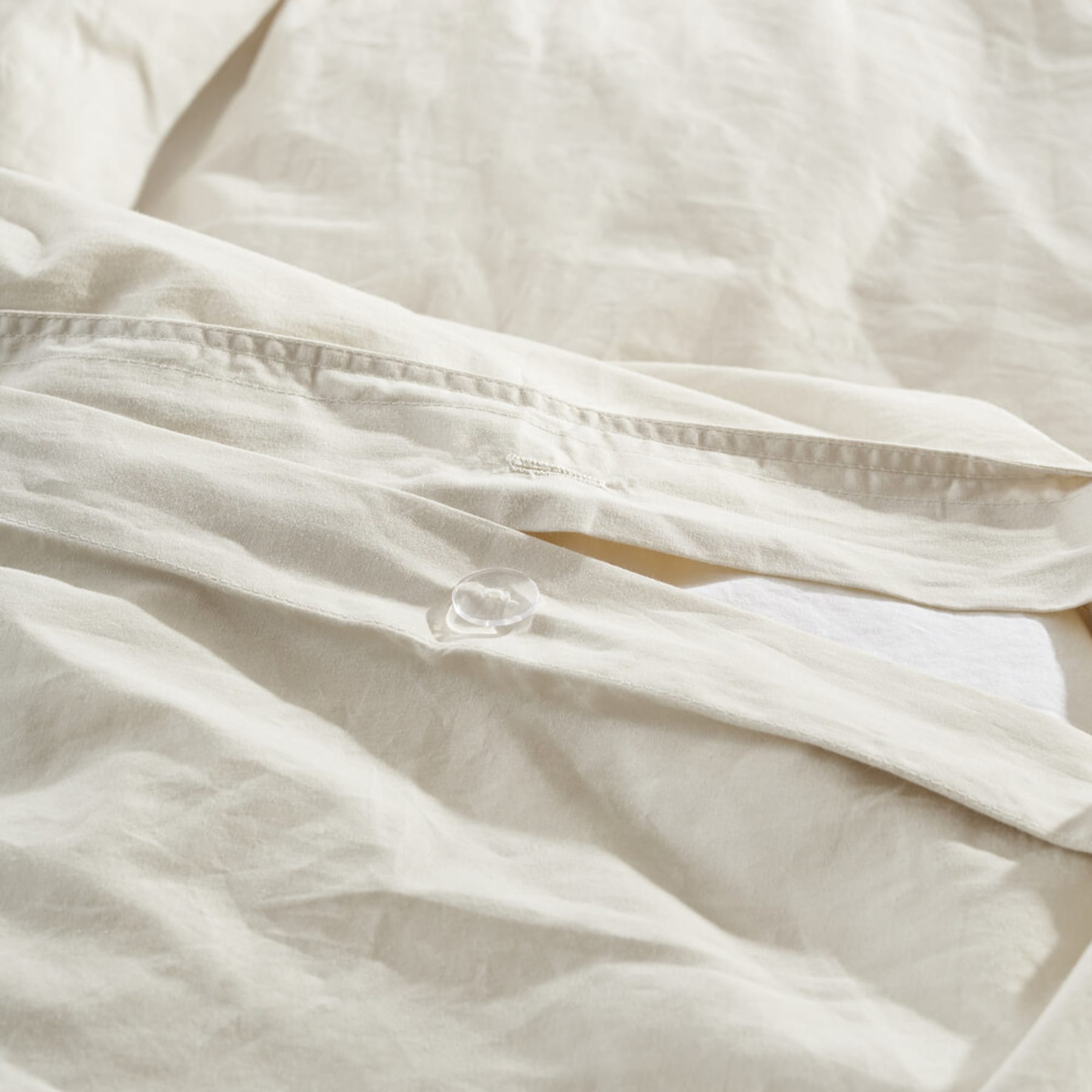
A Comprehensive Guide to Percale Sheets
One of the key factors that contribute to a comfortable slumber is high-quality bedding. Among the various options available, percale sheets have gained significant popularity due to their exceptional comfort, durability, and timeless appeal.
In this comprehensive guide, we take a closer look at percale sheets - exploring what makes them special, how to choose the right ones for your needs, how to care for them, and ultimately, how to enjoy the luxurious experience they offer.
What is percale?
Percale is a type of weave used when making bed sheets. It is characterized by its closely woven criss-cross pattern that results in a crisp, cool, and highly breathable fabric. The tight weave also creates a matte and smooth texture. Percale is known for its durability, strength, and resistance to pilling, making it a popular choice for many.

The Percale Sheet Set in Wheat.
On average, percale sheets usually feature a thread count between 200 to 400, but should at least have a thread count of 180. Typically, percale sheets are made from combed cotton, although they can be crafted from other fibres like linen or blends of materials like bamboo and microfibre.
Compared to other sheet weaves like sateen or flannel, percale has a more substantial and structured drape. It does not have the same sheen as sateen but offers a classic and timeless aesthetic that blends well with various bedroom decor styles.
Types of percale sheets
Percale sheets are primarily characterised by their weave structure rather than distinct "types." However, there are variations in the materials used and finishes applied to percale sheets.
Cotton percale sheets
Cotton percale sheets are the most common and popular type of percale. They are made from 100% cotton fibres and are highly breathable. Cotton percale sheets are known for their durability, softness, and ability to regulate temperature, making them a versatile and comfortable choice.

Our Percale Sheets are made from 100% cotton.
Egyptian cotton percale sheets
Egyptian cotton percale sheets are a premium variation of cotton percale. They are made from long-staple cotton fibres grown in Egypt, known for their exceptional quality. Egyptian cotton percale sheets are often associated with luxury thanks to their high thread count, which results in a silky-smooth texture, durable fabric, and superior breathability.
Because of its luxurious softness, Egyptian cotton tends to be more expensive than other types of cotton sheets.
Organic cotton percale sheets
Organic cotton percale sheets are made from cotton that is grown without the use of synthetic pesticides or fertilizers. They are an eco-friendly and sustainable option for those who prioritise responsibly-sourced and chemical-free products.
Organic cotton percale sheets offer the same benefits of comfort, breathability, and durability as traditional cotton percale - but are more pricey than regular cotton.
Blended percale sheets
Blended percale sheets are made by combining cotton with other fibres, such as polyester or rayon. These blends offer unique characteristics and advantages that 100% cotton percale sheets do not. For example, polyester blends introduce wrinkle resistance and enhance durability, while rayon blends can provide a silky texture and improved moisture-wicking properties.
Blended percale sheets can offer a balance between comfort and specific performance features. They also cost less than 100% cotton percale.
Benefits of percale sheets
Breathability
Percale sheets are highly regarded for their breathability, allowing air to circulate and heat to dissipate, which helps regulate body temperature during sleep. This makes them one of the best bed sheets for warm weather, as they can provide a cool, refreshing feel during the hotter months.
Comfort
Percale sheets offer exceptional comfort due to their smooth and cool feel against the skin. The tight weave structure creates a smooth surface that provides a luxurious and cosy sleep experience.
Percale sheets are also lightweight, which adds to their comfort. The fabric has a light and airy quality that contributes to an unrestricted feeling as you sleep. This weightlessness helps create a sense of relaxation and ease.
Durability
The criss-cross pattern of percale sheets creates a tight and dense weave, making them highly durable. Furthermore, the weave makes them resistant to pilling as it minimises the friction between fibres, keeping the sheets smooth and intact even after multiple washes and prolonged use.
Low maintenance
Percale sheets are generally easy to care for, which helps prolong their lifespan. They can withstand regular washing, and their durability allows them to maintain their quality even with frequent use.
While percale sheets are considered low maintenance, it's important to note that proper care is still necessary to ensure their longevity and optimal performance.
How to wash percale sheets
To prolong the lifespan and maintain the pristine quality of your percale sheets, proper care is essential.
Machine wash your percale sheets using a gentle cycle with cool or warm water. Avoid using hot water as it can cause shrinkage and may affect the quality of the fabric over time. Use a mild detergent that is suitable for delicate fabrics.
Refrain from using bleach or harsh laundry additives as they can damage the fibres and affect the colour of the sheets. Instead, opt for gentle and fabric-friendly alternatives.
When drying percale sheets, it’s best to let them air dry naturally. If it’s not possible, use a dryer in a low-heat setting to prevent excessive heat exposure.
Percale sheets are a great choice for anyone who wants comfortable and high-quality bedding without breaking the bank. Whether you prioritise comfort, durability, or style, percale sheets excel in all aspects. So, if you're looking to enhance your sleep quality and transform your bedroom into a cosy haven, consider investing in percale sheets — they are sure to provide you with comfort and satisfaction for a good night’s sleep.
FAQs
Are percale sheets good?
Yes, percale sheets are considered to be a great choice for bedding due to several reasons. Percale sheets are highly breathable, durable, and low maintenance. To add on, percale sheets are usually a more affordable option, making them more accessible. However, individual preferences may vary, so it's always a good idea to consider personal preferences and factors such as fabric composition, weave quality, and desired feel when selecting your preferred bedding.
What are percale sheets made of?
While cotton is the most common fibre used in percale sheets, there are other options worth exploring. Linen percale sheets bring a unique texture and natural elegance, while blends incorporating synthetic fibres can offer additional benefits such as wrinkle resistance or enhanced durability.